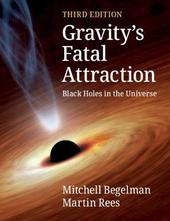
|
Gravity's Fatal Attraction: Black Holes in the Universe
Paperback / softback
Main Details
| Title |
Gravity's Fatal Attraction: Black Holes in the Universe
|
| Authors and Contributors |
By (author) Mitchell Begelman
|
|
By (author) Martin Rees
|
| Physical Properties |
| Format:Paperback / softback | | Pages:350 | | Dimensions(mm): Height 246,Width 190 |
|
| Category/Genre | Cosmology and the universe |
|---|
| ISBN/Barcode |
9781108819053
|
| Classifications | Dewey:523.8875 |
|---|
| Audience | | Tertiary Education (US: College) | | General | |
|---|
| Edition |
3rd Revised edition
|
| Illustrations |
Worked examples or Exercises
|
|
Publishing Details |
| Publisher |
Cambridge University Press
|
| Imprint |
Cambridge University Press
|
| Publication Date |
5 November 2020 |
| Publication Country |
United Kingdom
|
Description
Richly illustrated with the images from observatories on the ground and in space, and computer simulations, this book shows how black holes were discovered, and discusses what we've learned about their nature and their role in cosmic evolution. This thoroughly updated third edition covers new discoveries made in the past decade, including the discovery of gravitational waves from merging black holes and neutron stars, the first close-up images of the region near a black hole event horizon, and observations of debris from stars torn apart when they ventured too close to a supermassive black hole. Avoiding mathematics, the authors blend theoretical arguments with observational results to demonstrate how both have contributed to the subject. Clear, explanatory illustrations and photographs reveal the strange and amazing workings of our universe. The engaging style makes this book suitable for introductory undergraduate courses, amateur astronomers, and all readers interested in astronomy and physics.
Author Biography
Mitchell Begelman is Professor of Distinction in Astrophysical and Planetary Sciences and a fellow of JILA, at the University of Colorado-Boulder. He has won several awards, including the Guggenheim Fellowship, Sloan Research Fellowship, the American Astronomical Society Warner Prize, and the American Institute of Physics Science Writing Award (with Martin Rees, for the first edition of Gravity's Fatal Attraction). He is also the author of Turn Right at Orion: Travels through the Cosmos. Martin Rees is the UK's Astronomer Royal, a fellow (and former Master) of Trinity College, and was President of the Royal Society from 2005 to 2010. He is a foreign associate of the National Academy of Sciences, the Russian Academy of Sciences, the Pontifical Academy, the Japan Academy, and several other foreign academies. His awards include the Balzan Prize, the Bower Award, the Gruber Prize, the Crafoord Prize, and the Templeton Prize. In addition to his research publications, he has written extensively for a general readership. His ten other books include Before the Beginning, Just Six Numbers, Our Cosmic Habitat, and On the Future: Prospects for Humanity.
Reviews'Gravity's Fatal Attraction has masterfully enlightened two decades of my undergraduates with its spellbinding examination of the astrophysical roles of black holes in our cosmos - this updated edition, including the latest black-hole breakthroughs, will remain a peerless resource for years to come.' Niel Brandt, Pennsylvania State University 'In this singular book, Mitchell Begelman and Martin Rees lead us on a masterful tour of the mysterious physics, astronomical reality, and wonder of black holes.' Philip Armitage, Stony Brook University 'A remarkably readable and insightful exposition of nature's most exotic objects by two of the world's leading astrophysicists. This new edition brings the reader right up to the frontiers of the field, including discussions of the gravitational waves that we have now observed from merging black holes, as well as the remarkable advancements in event horizon imaging.' Christopher Reynolds, University of Cambridge 'Gravity's Fatal Attraction is an ideal book for those wanting to learn more about the fascinating physics of black holes and the Universe in a way that is technical rather than science fiction, but still readable and never condescending or needlessly mathematical.' Katie Sawers, Astronomy Now
|